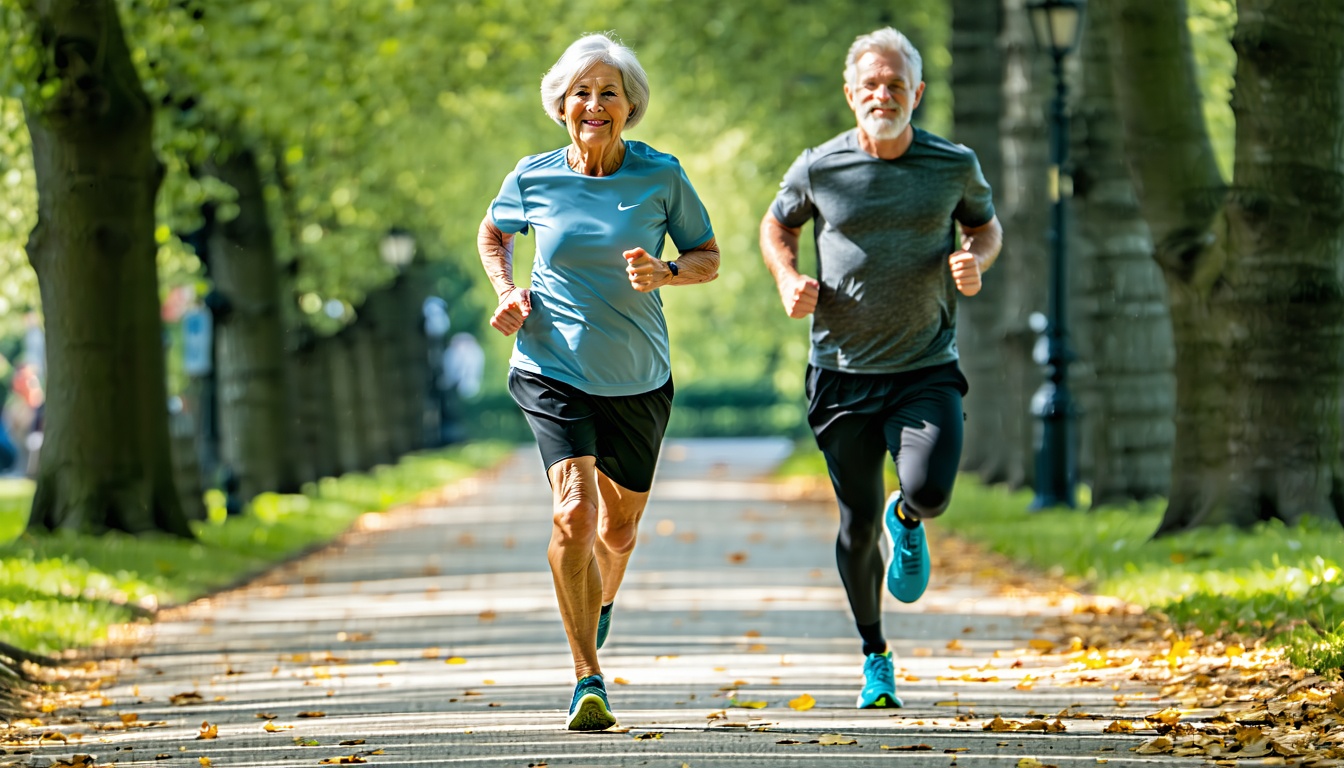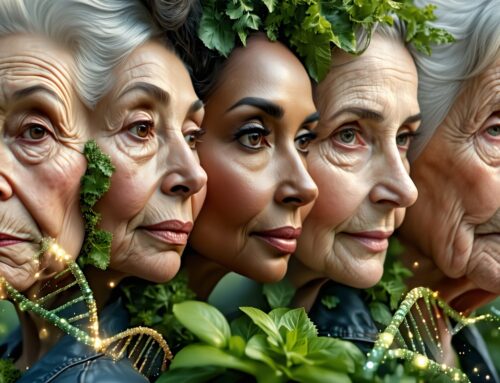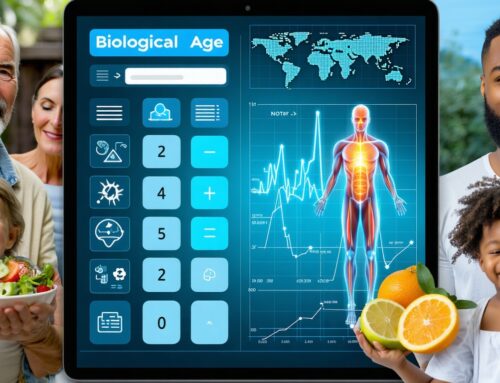Understanding Biological Age
Definition and Significance
Biological age is like the secret diary of your body’s health, revealing how well you’re holding up compared to the candles on your birthday cake. While chronological age is just a number, biological age tells the real story of your body’s wear and tear, influenced by a mix of factors and biomarkers. It’s a more personal peek into how you’re aging (Mayo Clinic).
Why does biological age matter? Well, it gives you the scoop on your health and how long you might stick around. Knowing your biological age can help you make smart choices to keep you feeling spry. Curious about how to figure out your biological age? Check out our guide on how to calculate biological age.
Factors Influencing Biological Age
A bunch of things can mess with your biological age, from your genes to how you live your life. Here’s the lowdown:
-
Genetics: Your genes only account for about 15% to 25% of how you age, meaning your lifestyle is the real MVP in keeping you young (Mayo Clinic).
-
DNA Damage: Over time, your DNA can get dinged up, speeding up the aging process. This includes mutations and other changes that mess with how your cells work.
-
Oxidative Stress: When free radicals and antioxidants in your body are out of whack, it can lead to cell damage and make you age faster. Want to know more about antioxidants? Check out our article on biological age and antioxidants.
-
Telomere Erosion: Telomeres are like the little caps on your chromosomes. As you get older, they shrink, leading to cell aging and dysfunction. For more info, visit our page on biological age and telomeres.
-
Senescent Cells: These are cells that have thrown in the towel and stopped dividing, causing inflammation and tissue damage.
-
Chronic Inflammation: Long-lasting inflammation can speed up aging and is tied to various age-related diseases. Dive deeper into this topic in our article on biological age and inflammation.
-
Lifestyle Factors: How you live your life plays a big role in aging. Stress, smoking, drinking, being a couch potato, and eating junk all affect your biological age. A bad diet can lead to obesity, a major aging factor. Learn more in our article on biological age and obesity.
-
Social Connections: Having friends can keep you young! People with strong social ties tend to be biologically younger than their actual age, while those without are more likely to age faster (Mayo Clinic).
By getting a grip on these factors, you can take charge of your biological age and boost your health. For a full rundown, try out a biological age calculator and explore different biological age assessment tools available.
Biomarkers for Biological Age
Getting a grip on your biological age means checking out different markers that show how your body’s holding up over time. We’re talking blood pressure, fancy imaging, and lab tests. Each one spills the beans on your health and how long you might stick around.
Blood Pressure Assessments
Blood pressure is like the gossip queen of your heart health—it tells all. Keeping tabs on it can help you spot trouble before it crashes the party. High blood pressure is a red flag for heart issues and strokes, which can speed up aging like a fast-forward button.
| Blood Pressure Category | Systolic (mm Hg) | Diastolic (mm Hg) |
|---|---|---|
| Normal | Less than 120 | Less than 80 |
| Elevated | 120-129 | Less than 80 |
| Hypertension Stage 1 | 130-139 | 80-89 |
| Hypertension Stage 2 | 140 or higher | 90 or higher |
Keeping your blood pressure in check with good habits—like moving your body and eating right—can help you keep your biological age in line. Curious about how to figure out your biological age? Check out our guide on how to calculate biological age.
Imaging Technology
Thanks to tech wizardry, we can now peek into your biological age with more precision. Gadgets like AI-powered EKGs can tell the difference between your actual age and how old your body feels. If there’s a big gap, it might mean trouble for your heart.
Imaging can also zoom in on senescent cells—those lazy cells that quit dividing and stir up aging and diseases. By studying these cells, scientists can learn more about aging and cook up ways to slow it down.
Laboratory Tests
Lab tests are the Sherlock Holmes of biomarkers—they dig deep into genes, proteins, and other stuff to give you the lowdown on your health and aging. Some popular tests for biological age are:
- Telomere Length Measurement: Telomeres are like the plastic tips on shoelaces, keeping chromosomes from fraying. They shrink as you age, so measuring them can give a clue about cellular aging.
- Inflammatory Markers: Chronic inflammation is like a speed demon for aging. Tests for markers like C-reactive protein (CRP) can help gauge your biological age.
- Oxidative Stress Markers: Oxidative stress is the villain that wrecks cells and speeds up aging. Tests for these markers can shed light on your biological age.
For a full scoop on your biological age, try out biological age assessment tools that use these lab tests.
By keeping an eye on these markers, you can take charge of your biological age and boost your health. Dive into our articles on biological age and longevity and biological age and exercise for more ways to stay young and lively.
Lifestyle and Biological Aging
Impact of Genetics
Your genes are like the blueprint for how your body ages. They decide how fast your cells wear out and how you handle life’s curveballs, like pollution or stress. While you can’t swap out your DNA like a pair of socks, knowing how it affects you can help you make smart choices to keep aging at bay. Curious about how to figure out your biological age? Check out our page on biological age assessment tools.
Role of Oxidative Stress
Oxidative stress is like a tug-of-war between free radicals and antioxidants in your body. Free radicals are those pesky troublemakers that mess with your cells, speeding up aging. Antioxidants are the good guys, keeping those radicals in check. Things like junk food, pollution, and smoking can tip the balance in favor of free radicals, while munching on antioxidant-rich foods can help keep them at bay. Dive into the world of antioxidants with our article on biological age and antioxidants.
| Factor | Impact on Oxidative Stress |
|---|---|
| Junk Food | Cranks it up |
| Pollution | Cranks it up |
| Smoking | Cranks it up |
| Antioxidant-Rich Foods | Calms it down |
Influence of Chronic Inflammation
Chronic inflammation is like a slow-burning fire that can lead to age-related health issues and speed up aging. It’s often sparked by stress, bad eating habits, and being a couch potato. Taming this fire with a balanced diet, regular workouts, and stress-busting activities can help keep aging in check. Want more details? Check out our article on biological age and inflammation.
| Factor | Impact on Chronic Inflammation |
|---|---|
| Stress | Fires it up |
| Bad Eating Habits | Fires it up |
| Couch Potato Lifestyle | Fires it up |
| Balanced Diet | Puts it out |
| Regular Workouts | Puts it out |
Getting a grip on how genetics, oxidative stress, and chronic inflammation affect your biological age can help you make choices that keep you feeling young. By tackling these factors, you can slow down aging and boost your overall health. For more tips on figuring out your biological age, swing by our page on how to calculate biological age.
Exercise and Biological Age
Exercise is like the secret sauce for keeping your biological age in check. By getting off the couch and moving your body regularly, you can give Father Time a run for his money. Let’s break down how sweating it out with aerobic exercise and pumping iron with resistance training can keep you feeling spry.
Effects of Aerobic Exercise
Aerobic exercise, or cardio for the cool kids, is all about getting your heart pumping and your blood flowing. It’s like giving your cardiovascular system a high-five. Doing aerobic exercise can seriously help you stay young at heart.
Take high-intensity interval training (HIIT), for example. This workout is like a fountain of youth for your cells, boosting the regeneration of mitochondria by a whopping 69%. HIIT is your ticket to better lung, heart, and circulation health, keeping you feeling fresh.
And let’s not forget your noggin. Aerobic exercise is a brain booster, increasing hippocampal volume in older folks, which means better memory and more brain power (PMC). Plus, it beefs up brain volume in areas that matter for thinking, like the frontal lobes and the corpus callosum (PMC).
Regular cardio can slow down those pesky age-related declines in fitness and heart health. It also jazzes up endothelial function, cranks up nitric oxide production, and keeps your heart rate variability in check (NCBI).
| Benefit | Description |
|---|---|
| Mitochondrial Regeneration | Gives your cells a 69% boost |
| Brain Health | Pumps up hippocampal volume and memory |
| Cardiovascular Health | Improves heart function and variability |
Benefits of Resistance Training
Resistance training, aka strength training, is all about flexing those muscles and building endurance. It’s your go-to for staying fit and independent, especially as the years roll by.
Lifting weights isn’t just about looking good; it’s got anti-aging superpowers. It tackles aging head-on, improving fitness, muscle function, and reducing frailty and disability. By keeping your muscles strong, you’re less likely to take a tumble or get hurt.
Resistance training is also a champ for your metabolism. It boosts insulin sensitivity, helping you keep blood sugar in check and dodge type 2 diabetes. Plus, it strengthens your bones, lowering the risk of osteoporosis and fractures.
Adding resistance training to your routine can seriously up your health game. For more on calculating your biological age and how exercise fits in, check out our article on how to calculate biological age.
| Benefit | Description |
|---|---|
| Muscle Function | Builds strength and endurance |
| Metabolic Health | Boosts insulin sensitivity |
| Bone Density | Strengthens bones and cuts fracture risk |
By getting the scoop on aerobic and resistance training, you can make smart choices for your fitness routine. These exercises are your ticket to keeping your biological age in check and living your best life. For more tips on biological age and exercise, dive into our articles on biological age and longevity and biological age and inflammation.
Social Factors and Aging
Importance of Social Connections
Let’s face it, being a social butterfly isn’t just about having fun—it’s about keeping your brain and body in tip-top shape. People with strong social ties often feel younger than their actual age, while those flying solo might feel like they’re aging faster than a banana left out in the sun. Having a solid group of friends or family can be your secret weapon against stress and loneliness, making you feel like you belong and boosting your overall health. So, whether you’re joining a club or just hanging out with your pals, staying connected is key to aging gracefully.
Cognitive Sharpness and Relationships
Your brain loves a good chat! Regular social interactions can be like a workout for your mind, improving your focus and memory. As you get older, keeping your brain sharp is crucial to fend off those pesky age-related memory lapses. Dive into activities that challenge your noggin—play games, learn something new, or join a lively discussion group. And don’t forget to move your body! Exercise isn’t just good for your muscles; it also keeps your brain in fighting form. A little sweat can go a long way in keeping you mentally spry and independent as you age.
To keep your mind in top gear, make physical activity a part of your daily routine. Curious about how exercise can turn back the clock on your biological age? Check out our section on biological age and exercise.
| Social Factor | Impact on Biological Age |
|---|---|
| Strong Social Connections | Feel younger, sharper mind |
| Lack of Social Connections | Feel older, risk of memory issues |
By making social connections a priority and engaging in brain-boosting activities, you can keep your biological age in check and feel great. For more ways to live your best life, explore our articles on biological age and diet, biological age and stress, and biological age and sleep.
Epigenetics and Biological Age
Epigenetic Clocks
Epigenetic clocks are like the Sherlock Holmes of aging research, sniffing out clues in your DNA to reveal your true biological age. These nifty tools measure DNA methylation in your blood, giving a pretty spot-on estimate of how old your body really feels. Turns out, this biological age is a big deal—it’s linked to stuff like feeling down in the dumps, the risk of getting breast cancer, and even how long you might stick around on this planet (Nature Medicine, J Gerontol A Biol Sci Med Sci, Journal of the National Cancer Institute, Aging).
| Health Outcome | Association with Biological Age |
|---|---|
| Feeling Blue | Positive |
| Breast Cancer Risk | Positive |
| Kicking the Bucket | Positive |
These clocks are the hotshot method for figuring out your biological age, way better than just counting birthdays. Some brainy folks even think we should base legal age on biological age instead of the number of candles on your cake.
Influence of Lifestyle Choices
Your lifestyle choices are like the steering wheel of your biological age. Take exercise, for instance—it’s been shown to mess with DNA methylation age in twins, hinting that your workout routine can slow down the wear and tear on your cells. So, getting off the couch and moving around is a big win for keeping the aging process in check.
| Lifestyle Choice | Impact on Biological Age |
|---|---|
| Hitting the Gym | Slows Aging |
| Junk Food Binge | Speeds Up Aging |
| Stressing Out | Speeds Up Aging |
Besides exercise, what you eat, how you handle stress, and how well you sleep also play a part in your biological age. Curious about how these factors affect aging? Check out our articles on biological age and diet, biological age and stress, and biological age and sleep.
Getting a grip on how your lifestyle choices affect your biological age can help you make smart moves for a longer, healthier life. By weaving good habits into your daily routine, you can give your biological age a boost and live your best life. For more tips on figuring out and keeping tabs on your biological age, swing by our guide on how to calculate biological age.






